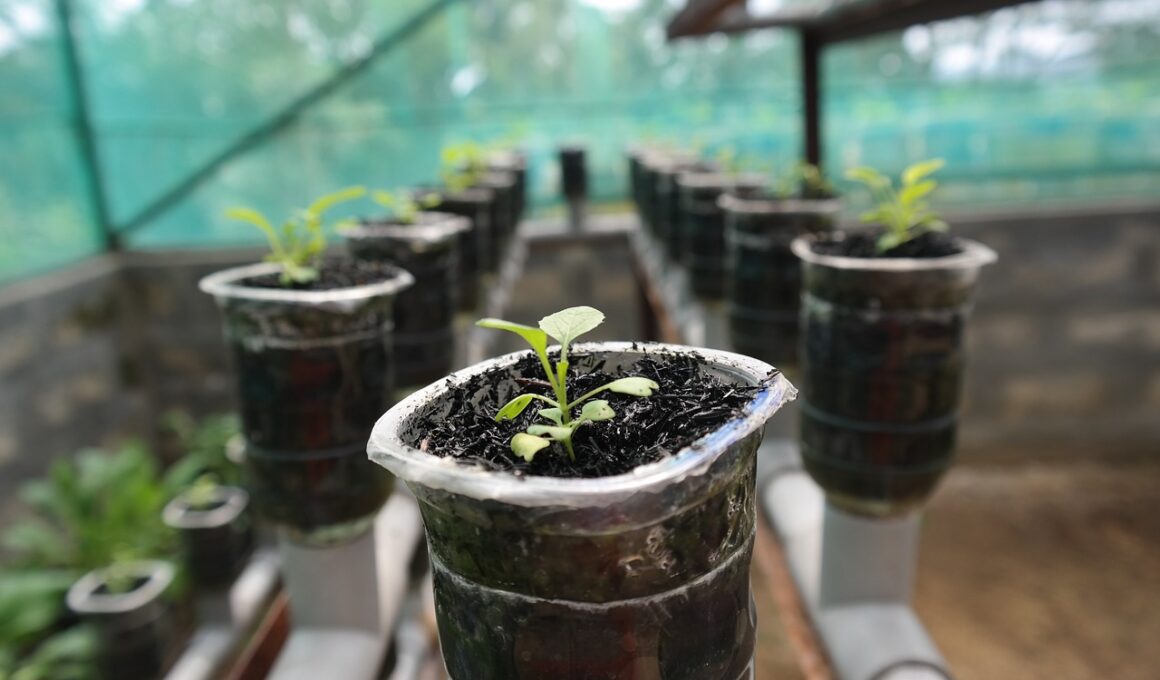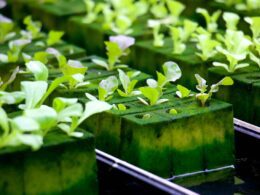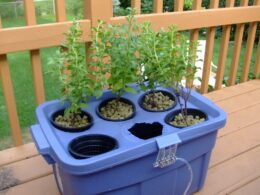Do you have concerns about the potential odors that could come from a hydroponic garden? While hydroponics may offer a range of benefits, including efficient use of space and resources, some people worry about the potential for unpleasant smells.
In this article, we’ll explore the factors that contribute to hydroponic smells, common misconceptions about them, and tips for minimizing odors in your hydroponic garden.
If you’re considering starting a hydroponic garden, it’s important to understand how different factors can affect the smell of your plants. While hydroponics can be a great way to grow a variety of crops, it’s also important to be aware of the potential for odors that may arise.
By understanding the factors that contribute to hydroponic smells, you can take steps to minimize any unpleasant odors and enjoy the benefits of growing your own produce in a safe and healthy environment.
Factors that Contribute to Hydroponic Smells
You’ll gain insight into the various factors that can contribute to the odors present in a hydroponic system. One of the biggest culprits is poor ventilation. Without proper air movement, stagnant air can lead to unpleasant smells in your grow space. To combat this, consider investing in ventilation solutions such as fans or air filters. These will help to circulate the air and remove any unwanted odors.
Another factor to consider is your nutrient choices. Some nutrient solutions can emit strong, unpleasant odors that can linger in your grow room. Be sure to research the different types of nutrient solutions available and choose ones that are less likely to produce strong smells. Additionally, make sure to follow recommended dosages and avoid overfeeding your plants, as this can lead to nutrient buildup and strong, unpleasant odors.
Overall, by being aware of the factors that can contribute to hydroponic smells and taking proactive steps to address them, you can create a clean and odor-free grow space. Keep in mind that proper ventilation and nutrient choices are key, and don’t be afraid to experiment with different solutions until you find what works best for you.
With a little effort and attention to detail, you can enjoy all the benefits of hydroponic gardening without any unwanted smells.
Odors Produced by Hydroponic Gardens
If you’re growing plants through hydroponics, it’s important to be aware of potential odors that may arise from your garden. Different types of plants have different smells, and some can be stronger than others.
For example, herbs like basil and cilantro have strong aromas that can easily fill a room. Meanwhile, leafy greens like spinach and lettuce tend to be more subtle in their scent.
The impact of nutrients on your hydroponic garden can also affect the odors produced. Overfeeding your plants can lead to a strong, unpleasant odor. On the other hand, providing your plants with the right balance of nutrients can result in a fresh, natural scent.
It’s important to monitor the nutrient levels in your hydroponic system to ensure that you’re not overfeeding or underfeeding your plants.
Overall, while hydroponics can produce some odors, they are typically not strong or unpleasant. By choosing the right plants and providing them with the appropriate nutrients, you can create a garden that is not only healthy but also smells great. Just be sure to keep an eye on your nutrient levels and adjust as necessary to maintain the perfect balance for your hydroponic garden.
Tips for Minimizing Hydroponic Smells
Ready to keep your hydroponic garden smelling fresh? Check out these helpful tips for minimizing odors!
One of the best ways to control odors in your hydroponic garden is by investing in an air filtration system. These systems work by removing the odor-causing particles from the air, leaving your garden smelling clean and fresh. Be sure to choose a system that’s the appropriate size for your garden and that’s rated to handle the types of odors your garden produces.
Another effective way to minimize hydroponic smells is by using odor neutralizing sprays. These sprays work by binding to the molecules that cause odors and neutralizing them, leaving your garden smelling fresh and clean. Be sure to choose a spray that’s safe for use in a hydroponic environment and that doesn’t leave behind any harmful residue.
To further minimize odors in your hydroponic garden, be sure to keep your plants clean and free of excess debris. This can be done by regularly cleaning and sanitizing your equipment, as well as by removing any dead or decaying plant matter from your garden.
By following these simple tips, you can enjoy all the benefits of hydroponic gardening without having to worry about unpleasant odors.
Common Misconceptions about Hydroponic Smells
Don’t be fooled by common misconceptions – hydroponic gardens can be just as fresh and odor-free as traditional soil gardens with a few simple tips and tricks. Here are some common misconceptions about hydroponic smells that you need to know:
-
Hydroponic gardens are not smelly because they don’t use soil. The smell in a hydroponic garden comes from the plants themselves, not the absence of soil. With proper hydroponic ventilation, you can keep the air flowing and prevent any unpleasant smells from building up.
-
Hydroponic gardens won’t make your whole house smell. If you are worried about the smell, you can use scent masking techniques to keep the air smelling fresh. For example, you can use air fresheners, essential oils, or even scented candles to mask any unpleasant smells.
-
Hydroponic gardens are not harder to maintain than traditional soil gardens. In fact, hydroponic gardens are often easier to maintain because you have more control over the growing environment. With the right equipment and a little bit of knowledge, you can create a hydroponic garden that is just as easy to maintain as a traditional soil garden.
In summary, don’t let common misconceptions about hydroponic smells discourage you from starting your own hydroponic garden. With proper hydroponic ventilation and scent masking techniques, you can create a fresh and odor-free growing environment that is just as enjoyable as a traditional soil garden. So go ahead and give hydroponics a try – you might be surprised at how easy and rewarding it can be!
Conclusion and Summary of Key Points
You’ll be amazed at how easy it is to keep your hydroponic garden smelling fresh and clean once you understand the importance of proper ventilation. Good airflow is essential for preventing odors from building up in your garden. A well-ventilated grow room will also reduce the risk of pests and diseases, which can also contribute to unpleasant smells.
Another important factor to consider is your nutrient choice. Certain nutrients can have a stronger smell than others, so it’s essential to choose high-quality nutrients that are specifically designed for hydroponic use. Many hydroponic growers prefer to use organic nutrients, as they tend to have a milder scent. Always follow the instructions on your nutrient package and avoid overfeeding your plants, as this can cause a buildup of excess nutrients and odors.
In summary, maintaining an odor-free hydroponic garden is all about proper ventilation and nutrient management. By ensuring good air circulation and choosing the right nutrients, you can keep your garden smelling fresh and clean.
Remember to check your plants regularly for signs of pests or disease, and address any issues promptly to prevent odors from developing. With a little bit of effort, you can enjoy all the benefits of hydroponic gardening without any unpleasant smells.
Frequently Asked Questions
How does the smell of hydroponics compare to traditional soil gardening?
When it comes to comparing the smell of hydroponics to traditional soil gardening, there are some noticeable differences. While traditional soil gardening can produce a distinct earthy aroma, hydroponics typically have a milder scent.
However, this doesn’t mean that hydroponics are completely odorless. To reduce any potential smells, there are several techniques you can try, such as using odor-reducing products, ensuring proper ventilation, and maintaining optimal nutrient levels.
By implementing these practices, you can enjoy the benefits of hydroponics without any unpleasant odors.
Can the type of plant being grown affect the smell in a hydroponic system?
When it comes to the smell of your hydroponic system, plant selection is key. Different plants have different levels of odor, and some may be more pungent than others. To minimize any unwanted smells, it’s important to choose plants that are known for their low odor levels.
Additionally, odor control measures such as air filtration and proper ventilation should be implemented to keep your system smelling fresh. By carefully selecting your plants and taking steps to control odor, you can enjoy the benefits of hydroponic gardening without any unpleasant smells.
Are there any health concerns associated with hydroponic odors?
When it comes to hydroponics, it’s important to consider odor control and potential health risks. While hydroponic systems themselves don’t inherently produce strong odors, the plants being grown can emit scents that vary in intensity.
Some plants, like herbs and flowers, may produce pleasant aromas while others, like certain vegetables, may have a stronger, less desirable smell. However, if the odor becomes too strong, it can be a sign of poor ventilation or other issues that could impact plant growth and lead to health risks.
To prevent this, it’s important to ensure proper odor control measures are in place, such as using carbon filters or fans, and monitoring the system regularly to address any potential problems. By taking these steps, you can enjoy the benefits of hydroponics without any unwanted odors or negative health effects.
How do you properly clean and maintain a hydroponic system to prevent odors?
To prevent any unpleasant odors from your hydroponic system, it’s important to use proper cleaning techniques and odor control products.
First, make sure to regularly clean your system by flushing out the reservoir, wiping down the grow trays, and sterilizing any equipment. You can also use natural cleaning solutions, such as vinegar or hydrogen peroxide, to keep your system clean.
Additionally, consider using odor control products, such as activated carbon filters or essential oils, to help neutralize any odors.
By taking these steps, you can ensure that your hydroponic system remains clean and odor-free, creating a safe and enjoyable growing environment.
Can hydroponic systems be used indoors without producing strong odors?
If you’re considering using an indoor hydroponic system, you may be wondering if it will produce strong odors. The good news is that with proper odor control techniques, you can keep any smells to a minimum.
One effective method is to use carbon filters in your ventilation system to absorb any odors before they escape into the room. You can also try using odor-neutralizing sprays or air purifiers.
It’s important to regularly clean and maintain your system to prevent any buildup of organic matter that can cause unpleasant smells. With a little effort, you can enjoy the benefits of hydroponics without any unwanted odors.
Conclusion
So, you have it – the answer to the question ‘Do hydroponics smell?’ is yes, but it depends on a few factors.
The main odor-producing culprits in hydroponic systems are stagnant water, decaying plant matter, and root rot. Luckily, there are a number of steps you can take to minimize these smells, such as using air stones, regularly cleaning your system, and using proper nutrient management.
It’s important to note that not all hydroponic systems will create strong odors – it largely depends on the type of setup you have and how well you maintain it.
With a little bit of effort and some attention to detail, you can keep your hydroponic garden smelling fresh and clean. Happy growing!








